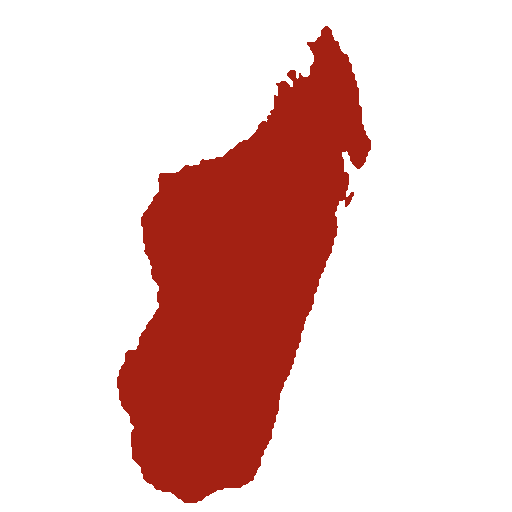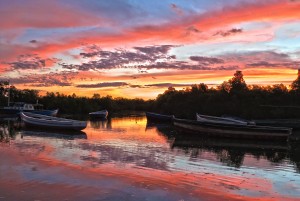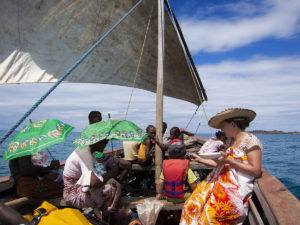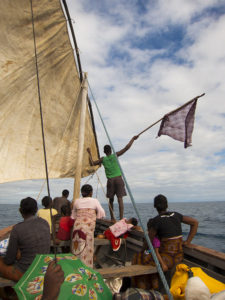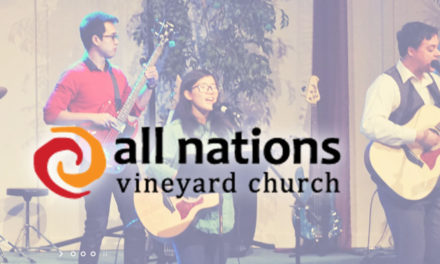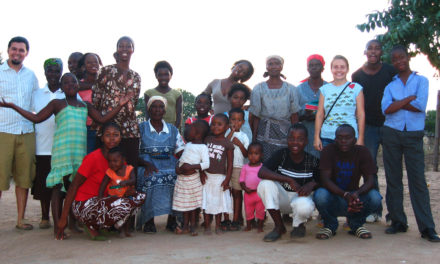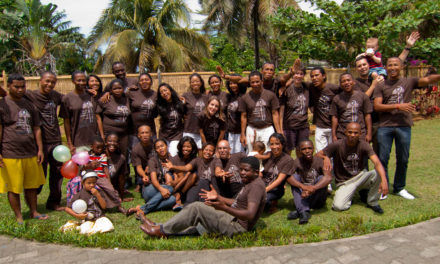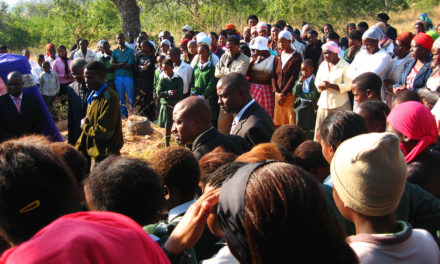T here’s a lot we don’t know about living near the ocean and depending on it for so many aspects of our lives. I should’ve had my first clue about that over a month ago when I took my first boat ride to Nosy Mitsio from Port St Louis.
Our crowded boat left the port at about 3:30am, during high tide and the best winds. It was just a sailing boat, no motor, no lights, nor anything like that. As the boat silently glided out from the docking area, navigating the mangrove swamp with long poles, I watched from my seat near the edge and was surprised by what I saw. Everywhere there was a ripple it was glowing fluorescent! Each push of the pole, every little drop of water as it was lifted up again, every little bug splash or fish coming to the surface – everywhere the water was disturbed it had an eerie glow!
I watched it for a long time to see if it wasn’t just a trick of my eyes, or if there weren’t some lights on the side of the boat that I simply didn’t see, and there wasn’t even the moon shining overhead, but there it was – an unexplained fluorescent glow on every ripple! For any of you who’ve seen the movie “Life of Pi”, you’ll have an idea what I’m talking about. Sure, it was exaggerated in the movie, but I’ve seen the same effect in real life! I guess when your eyes adjust to the darkness like that, then even the dim light of the stars reflect on the rippling water, and make it seem to glow. To me though, it was just a curious novelty, very fascinating. I had no idea it was really signifying the world of difference between inland life and life at sea.
I suppose that reality didn’t fully set in until just a few days ago. After we as a family moved here to Nosy Mitsio, to begin building our permanent house for our next few years of life and ministry here, we needed to return to the mainland to attend a required meeting in a distant city. We checked around at several different villages near our part of the island to see if anyone knew of a boat that would be leaving soon. Finally, we met up with one boat owner who said he’d be leaving one or two days later. We got the message that night that we’d be leaving the next morning, so we had to pack quickly. Thankfully it wasn’t a long hike to where he keeps his boat, and initially the trip seemed like it would be smooth and easy.
On the other hand, as we set out from Nosy Mitsio, I noticed the boat captain was using just his sail with hardly any wind and that he was reluctant to set up his motor. We drifted along at a slow rate which my GPS told me would take 13 hours to reach shore (about midnight). After about 2 hours of that, the general talk on the boat convinced the captain to set up his motor. So he took his sail down, got his engine ready, and we were zipping along at a fast 10 km/h for about 15 minutes. Then the motor died.
At first I thought it was humorous how right there in the middle of the ocean, floating in circles without a rudder, the boat captain was trying to repair his little engine – taking it apart, cleaning pieces, replacing them, etc. But after about 30 minutes of not being able to get it started again, I got a little concerned. Then they got out a bright piece of cloth, fashioned it into a flag, and started waving it back and forth in the hopes of attracting someone’s attention. Whose attention, I have no idea, because there were no other boats or canoes in sight anywhere on the horizon. Were we stranded at sea?

Matimu wasn’t too happy when the waves first splashed in and woke him up, otherwise he loved all the bouncing around and had no idea we might be in trouble.
Then the wind started blowing pretty heavily against us, so they set up the sail again and tried to use the contrary wind to plow forward. But the waves built, water splashed in, and we were making little headway. Not quite halfway from Nosy Mitsio to the mainland port (there’s about 35 km, or 21 miles between the two) the decision was made to call it quits and head back home.
With the wind at our backs, we were zipping along! We were now going faster than the motor at its best could take us. But bouncing up and down the growing waves with the crazy wind ripping around us didn’t make me feel any better about our speed. I was beginning to understand the power of the ocean. When you’re riding in a boat less than 3 feet deep, 6-10 foot tall waves crashing all around can quickly make things very scary! I started thinking of all those stories in the Bible of crazy sea storms: Jonah, Jesus asleep in the boat, Paul’s shipwrecks, etc. And I doubt our bad weather had any real comparison to those stories. It’s no wonder that when measured against the untouchable power of the sea, Jesus’s ability to calm it with just his words struck fear and awe into everyone around him. He certainly gave me peace as I prayed to the only one who has any say over such incredible power.
The storms didn’t die down anytime soon, but in just two hours, we covered the distance that first took us four hours. We were back on shore just as the sun was setting. The king of Nosy Mitsio had heard the news of our return, met us on the paths halfway, and we all returned to our village (Ampasindava) slightly defeated.
L ike I said in the beginning, there’s a lot we don’t know about living near the ocean and depending on it for so many aspects of our new lives. But in our short time here so far, we’re beginning to learn some of it. For example, the morning wind is often gentle, usually comes from the northeast and is called “avaratrahazo”. The afternoon/evening wind is usually stronger, comes from the west, and is called “talio”. Naturally, that’s the best wind for getting back to the mainland (east of Nosy Mitsio). But sometimes the “avaratrahazo” lasts all day long, and when it does, it’s the main topic of conversation in Nosy Mitsio’s villages.
On our ill-fated day of trying to return to the mainland, not only did the “avaratrahazo” return again in the afternoon, but it came back with a vengeance! All evening and all night long, it blew harder than any winds we’ve seen here yet (and that’s saying a lot). Not only did it send our boat flying back home, but all evening and night it blew off the miniscule bristles of one particularly abundant and hateful plant (lantana), settling on anyone walking around, invading through all the cracks in all the houses, making us prickly and itchy all night long and all the next day. There are plenty of reasons the wind is the big thing to talk about on our little island!
So yes, now we realize some of the depths of our ignorance about our new life here, and how the sea itself is the major difference. But there have been plenty of other hints all along. The one big thing I’ve tried to figure out since we first visited Nosy Mitsio is: how do we get here when we want to, and how do we leave when we need to? Though I’ve asked this same question to dozens of people, in many different villages, in Port St Louis (the main port for Nosy Mitsio), and to anyone who’s even heard of Nosy Mitsio, I still don’t have the answer. Boats of various sorts do come and go, but when, or about how often, or even the typical price, no one can tell me a straight answer. Stated departure times often change drastically just within the span of a five minute conversation. Even the boat captain from our fateful trip has said he won’t know when he can try to leave again, only that we should keep our bags packed so we can be ready to go as soon as he passes by. I always thought they had a way of looking at the weather and figuring out if the next day or even later in the day it would be good. But the boat captain said, no, we won’t know until there’s good weather actually there. As I write this, we still don’t know if we’ll be able to leave here in time to get to that meeting we’re supposed to be at.
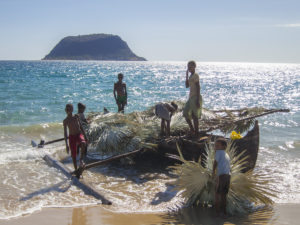
A delivery of “satrana” leaves used as roofing materials for our (soon-to-be) house – being unloaded from the canoe by some children.
That sort of ambiguity has permeated everything we’ve done here (or tried to do) regarding Nosy Mitsio so far. Materials which are obviously regularly used to build houses here, and which everyone says are in abundance, have been notoriously difficult to get when we need them. Some of it certainly has to do with transport (our biggest problem), but for a lot of it, there’s simply no explanation. Prices change regularly (up and down), stated availability, quality, who’s able to collect what, etc. It’s been very difficult to make progress on building our house; so far, we only have an area cleared. We still don’t have a toilet (outhouse) built or a place to bathe. For that matter, even where we’re supposed to relieve ourselves in the meantime isn’t particularly clear and we’re just hoping some lumber will arrive soon (already 10 days late) so we can have our toilet finished.
People give us news of things we’re waiting for that they’ve seen in the port, but no one can tell us when they saw it or how many days or weeks ago. Places or boats seen across the ocean look deceptively close, when in reality they’re still miles and miles (and hours and hours) away.
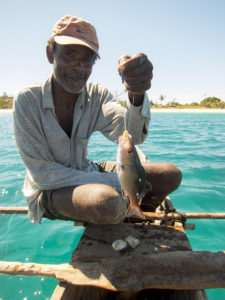
The fish we caught weren’t big, but there were plenty of them and it made a nice meal! The king of Nosy Mitsio is a patient teacher.
How do we buy fish or other seafood from people, is there a standard price, or do we just have to learn to get it ourselves from the ocean? What about coconuts? We still don’t know, but at least my first fishing trip with the king was a minor success and we had a tasty meal to show for it. Today was a full moon and a high tide, and the ocean nearly swept our roof thatching back out to sea (it was delivered to and stored on the beach). So now we know we have to always remember and observe the changing tides. There are taboos regarding where to bathe, when to dig in the soil, what kind of meat or beans to eat, when work can be done aboveground, when you can go fishing, what day of the week you can travel by boat (regardless of weather), and probably hundreds of others that we haven’t even heard of yet. We’ve already broken a few of the taboos and only learned they existed afterwards.
T he unknown, and its accompanying ambiguity, surrounds us the way the small island of Nosy Mitsio is surrounded by the vast Indian Ocean! Being an American who likes to know the facts, consider them, and respond directly, I’ve been very frustrated by this ambiguousness – give me something clear that I can grasp onto! But can it be any other way? Despite our awesome advances in science, our deep sea submersibles and all the rest, what we see there in the ocean is terrifying and awe-inspiring. So many of the new discoveries recently found in the ocean’s depths were inconsiderable and unimaginable before. And despite so much knowledge, so much about the sea is yet unknown. And here on Nosy Mitsio, so far detached from the developed world, far less still is known about the ocean’s workings. Is it any wonder the ever-changing and unknowable attitude of the ocean has created a culture of the ambiguous unknown?
And so here we find ourselves, on a little island of our own making, the thoughts in our own heads clear and searching for clarity, while on every side we’re being battered by the waves of uncertainty. It’s easy to feel like we’re stranded at sea!

Some sort of large cruise ship that passed by Nosy Mitsio several times, while the kids (including Matimu) were using leftover construction materials to build their own houses on the beach.
This is our first time to really be pioneers of something big like this. Yes, with Peace Corps, we were the first Volunteers in our village in South Africa, and so in some sense, it was a pioneer work and we paved the way for the next set of Volunteers and the continuing work. But our village’s schools requested Peace Corps Volunteers, they met with Peace Corps personnel multiple times before our arrival, village representatives went to a training meeting about how to receive and support us, etc. Here on Nosy Mitsio, we’re really paving the whole way ourselves. Before us, there have only been a couple of very short survey trips made here by AIM (we were with one of them), and they didn’t stay in any of the villages, and much of the communication was done through a translator. So basically all that the people of Nosy Mitsio know about us and our purpose is what we demonstrate and explain to them now. We’re trying to figure them out, and it’s hard! I can imagine it must be similarly hard for them to figure us out, why we’re here to stay in one of their villages, and why we’re not simply sailing by on a luxury yacht or catamaran. (We actually see plenty of those pass by our side of the island, but we’ve yet only seen one of them stop and briefly come to shore to ask someone to cook their fish for them.)
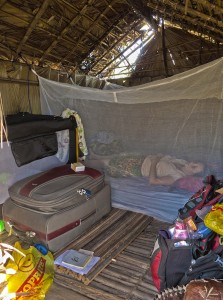
Our temporary home in Nosy Mitsio while waiting for our house to be built. It’s quite a squeeze and rain poured in for the first week, but at least now the leak is fixed.
S ometimes I ask why we’re going through all of these challenges. Is it worth it? Couldn’t someone else be doing this instead? I look ahead to the day when we’ll have our own personal space, a house to live in, some shade to sit under during the heat of the day, a toilet to use, and a place nearby to bathe and get clean. By then we should also be much better at speaking and understanding the local dialect. Then, I say, it’ll be worth it. But couldn’t someone else have come here first to do the hard parts, to figure everything out and let us know these unknowns?
Apparently not. God has a plan here, and somehow according to his will, we figure into it. There’s no one else to do this and he’s asked us to. There are many prophecies in the Bible about the islands knowing God’s glory, but I recently saw this one in Zephaniah 2:11 that I like: “…to him shall bow down, each in its place, all the coasts and islands of the nations.” The Antakarana are mainly a people of the coastlands, and on this island they’ve found a refuge. According to the prophecies of Zephaniah, even here the people will know and follow God. They’ll be part of that great picture in Revelation, where people from every different language and people group will be worshipping God in his Kingdom. And according to the way God’s set it up, someone has to come here and announce the good news to them. As we’ve prayed, we’ve seen that he’s chosen us. And he’s chosen other people to join us in this work next year. But for now and during this time we’re the ones doing the preparation.
So while we’re here on this island trying to prepare the way for ourselves and for our teammates to arrive, sorting through the uncertainty, seeking clarity, and just trying to get by; while the waves are crashing against us on every side, we know that we serve the one who calms the seas. Where he leads us, we follow. I certainly wasn’t sleeping in our boat during the storm the other day, but knowing that Jesus can calm the storms helps give me the faith I need to follow him even when it’s tough. It helps strengthen me to wait for the day when we’ll see the beautiful results of this work he’s called us to: the Antakarana people knowing and following God, on this small island and beyond.
Even when our doubts are loud in our minds, I’m reminded by David in Psalm 65:5-8 :
In Christ,
Adam, Lora, and Matimu
P.S. The “avaratrahazo” lasted 4 ½ days. Then on the 6th day we tried to leave again and it came back. The next day was a taboo to travel even though the winds were great. The next day, we left and drifted around in slow winds before having to come back again. Finally, over a week after our first attempt, we left again, had great winds until the sun set, then paddled the last three hours to the port in the dark. We were too late to make it to the meeting (though we tried leaving a week in advance), but we finally managed to leave Nosy Mitsio to get more construction materials and try to get our home-building moving forward again. We’re learning patience, but it’s a hard lesson!
Also, we have a new mailing address in the town nearest us! We’d love to hear from you any time. If you’re interested, then on our “contact us” page you can read a list of things we’d really appreciate having sent here from the US. Here’s our address:
Adam and Lora Willard
BP 12
Ambilobe
204
Madagascar

Matimu is certainly enjoying the life at sea – the rocking of the boats, the sand to dig in and throw, the seashells everywhere – it’s all a blast to Matimu!
